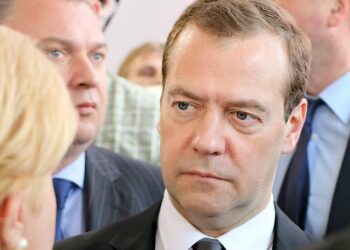The European Union has announced an extension of its personal sanctions against Russian individuals for an additional six months, reinforcing its stance amid ongoing tensions related to the conflict in Ukraine. This decision comes despite resistance from member states Hungary and Slovakia, which have expressed concerns over the measures. The extension underscores the EU’s continued commitment to holding accountable those deemed responsible for actions undermining Ukraine’s sovereignty, even as internal divisions among member countries surface.
EU Extends Personal Sanctions on Russia Amidst Eastern Bloc Opposition
The European Union has decisively extended personal sanctions against key Russian figures for an additional six months, a move aimed at maintaining pressure amid ongoing geopolitical tensions. Despite significant resistance from Hungary and Slovakia, members of the Eastern Bloc, the EU’s collective determination to uphold these restrictions prevailed in the council vote. The sanctions target individuals linked to Russia’s government, military aggression, and human rights violations, underscoring the Union’s commitment to its foreign policy objectives.
Sources indicate that Hungary and Slovakia’s opposition centered on concerns about the impact of prolonged sanctions on regional energy security and diplomatic diplomacy. However, the majority of member states argued the sanctions are necessary to uphold international law and deter further destabilizing actions. Below is a summary of key points from the recent EU Council decision:
- Duration: Extension for 6 months, until January 2025
- Targets: Approximately 200 individuals linked to Russian authorities
- Opposition: Hungary and Slovakia expressed reservations
- Majority stance: Sanctions seen as essential for regional security
| Country | Position on Extension | Primary Concern |
|---|---|---|
| Hungary | Opposed | Energy supply security |
| Slovakia | Opposed | Regional stability |
| Germany | Supported | Upholding international law |
| France | Supported | Deterrence of aggression |
Hungary and Slovakia Challenge Sanctions Renewal Citing Economic Concerns
Hungary and Slovakia have voiced strong opposition to the European Union’s decision to prolong personal sanctions on Russia, emphasizing the negative ripple effects these restrictions have had on their domestic economies. Both governments argue that the sanctions impede vital trade relations and energy supplies, which are crucial for their economic stability. Officials from these countries highlighted rising inflation rates and increased operational costs for businesses directly affected by the sanctions as major concerns during recent discussions with EU leaders.
To underline their position, Hungary and Slovakia presented key economic indicators that they claim justify a reassessment of the sanctions’ duration and scope. These indicators include:
- Decline in bilateral trade volumes with Russia since the sanctions’ imposition
- Increased energy import costs, particularly natural gas and oil
- Adverse effects on manufacturing sectors dependent on Russian raw materials
| Economic Indicator | Hungary | Slovakia |
|---|---|---|
| Trade Volume Change (%) | -18% | -22% |
| Energy Cost Increase (%) | +35% | +29% |
| Manufacturing Output Change (%) | -12% | -15% |
Experts Recommend Strengthening EU Unity to Maintain Pressure on Russia
Amid growing challenges within the European Union, experts stress the critical need for enhanced solidarity among member states to sustain the effectiveness of sanctions imposed on Russia. The recent extension of personal sanctions by six months reflects the bloc’s commitment to deterring aggression, despite opposition from Hungary and Slovakia, which have voiced concerns over the economic and political ramifications of continued pressure. Analysts warn that fragmentation could weaken the EU’s collective leverage, potentially emboldening Moscow’s strategic aims.
Key recommendations from experts include:
- Establishing a unified communication strategy to counter disinformation campaigns.
- Increasing support for Eastern European countries directly affected by the conflict.
- Enhancing coordination between EU sanctions and allied international measures.
- Developing contingency plans in case of further political dissent within member states.
| Expert | Focus Area | Key Suggestion |
|---|---|---|
| Dr. Martina Weber | Political Unity | Streamline decision-making processes |
| Luca Romano | Security Policy | Boost EU strategic autonomy |
| Elena Petrova | Sanctions Impact | Enhance cross-border economic resilience |
Insights and Conclusions
As the EU moves forward with extending personal sanctions on Russia for an additional six months, the decision underscores the bloc’s continued commitment to responding firmly to the conflict despite dissent from member states like Hungary and Slovakia. The extension reflects the ongoing tensions within the union but also signals a unified stance on upholding consequences amid the broader geopolitical challenges in the region. How the EU will navigate these internal divisions while maintaining pressure on Russia remains a critical factor in shaping the future of European security and diplomacy.















